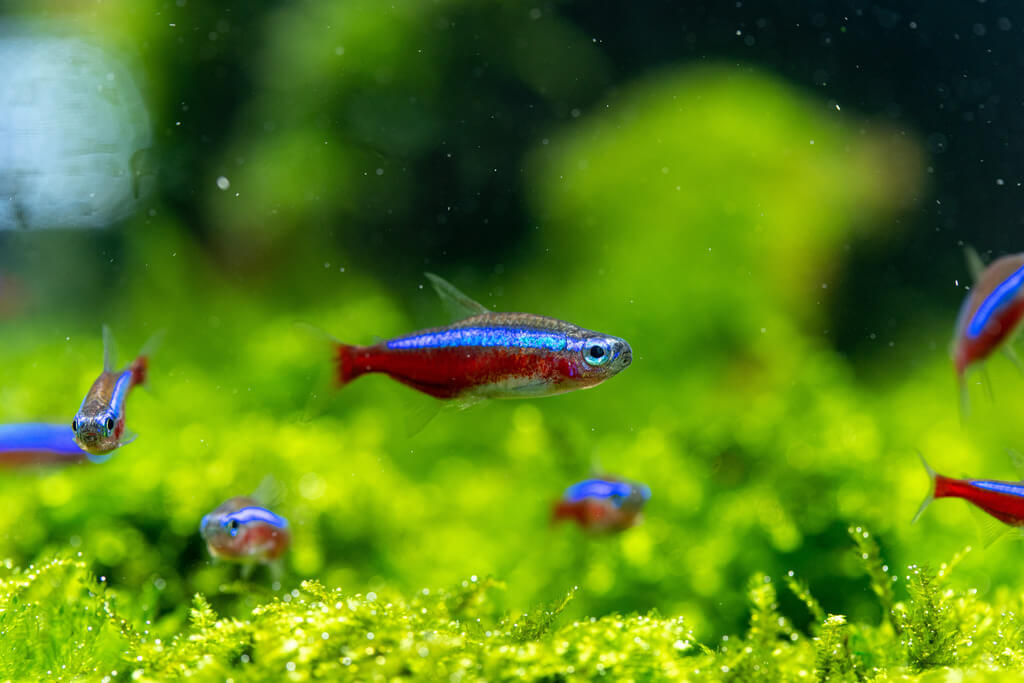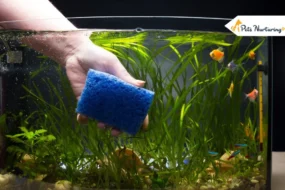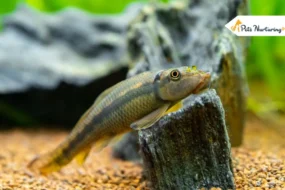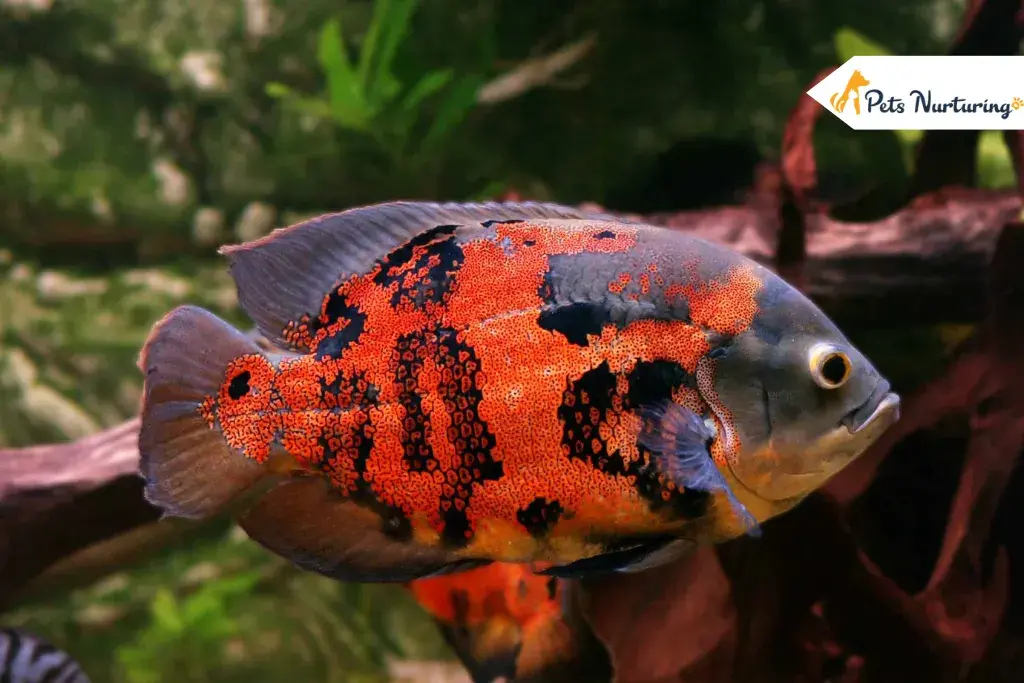
Part of the Cichlidae family the Oscar fish comes in colours like yellow and blue, black or full white but their signature is black and orange stripes.
What is an Oscar Fish?
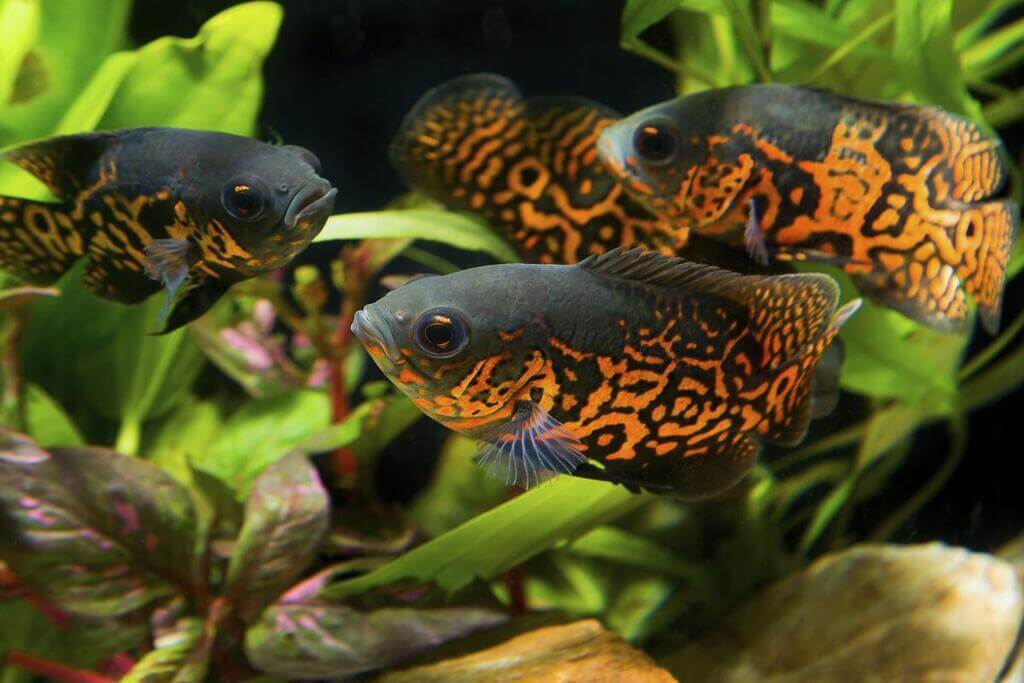
The simple answer to ‘what is an Oscar?’ is that they are a tropical species of fish native to South America. Oscar fish is a popular choice for freshwater aquariums. These Oscar tank mates must have similar and suitable temperaments to co-exist or they can get pretty territorial.
Oscar fish are scientifically known as astronotus ocellatus. They are also known by some common names like tiger Oscar fish, velvet cichlid, marble cichlid, blue Oscar fish, Oscar cichlid, albino Oscar, lemon Oscar, red Oscar depending on their colour and pattern.
Oscar the fish is also found in countries like China, India and some parts of the USA. although with their one-of-a-kind appearance they’ve become popular worldwide.
Oscar fishes are quite easy to care for but we advise you only get them if you’re a moderately experienced aquarist as they can sometimes be dangerous to their Oscar tank mates.
Overview of Oscar Fish
Oscar Fish Overview
Scientific Name: Astronotus ocellatus
Common names : Tiger Oscar Fish, Velvet Cichlid, Marbled Cichlid And Water Dog
Habitat: South America and some parts of China, India and USA
Care level: moderate
Temperament: Aggressive
Oscar fish size: 12 – 14 inches long
Lifespan: 15 – 20 years
Diet: Omnivore
Colors or pattern: Tiger Oscar, Blue Oscar Fish, Oscar Cichlid, Albino Oscar, Lemon Oscar, Red Oscar and Veil Tail Oscar.
Minimum fish tank size : 55-gallon
Temperature : 75 – 80 degrees Fahrenheit
pH of water: 6 – 8
Tank level: Mid to top dweller
Breeding: Egg layer
Hardness of water: 5 dgH
Tankmates: Jack Dempsey, common pleco, clown loaches and fire mouth fish.
Susceptible to : Hole in the head disease
What Makes Oscar Fish Unique?
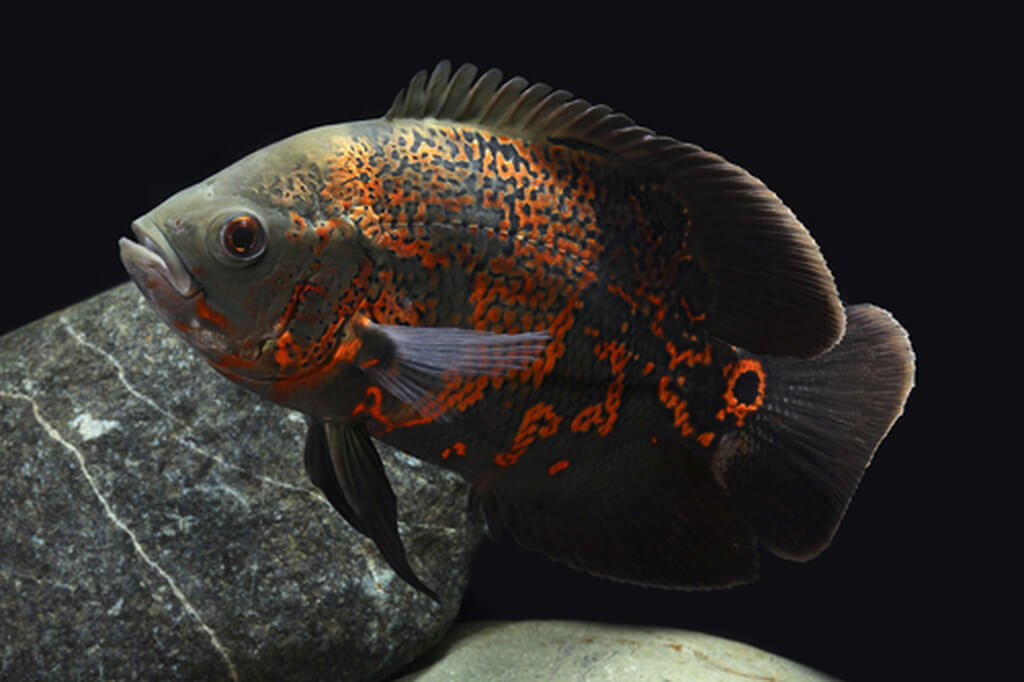
Well, the Oscar fish is more intelligent than most other fish. They interact with the owner and convey their emotions. If they love the food you are offering, they’ll let you know by wagging their tail fins, just like dogs do. This is why they are also known as water dogs.
Oscar fish are so curious and intelligent that their personality gets the owner very attached to them.
Origin and Habitat
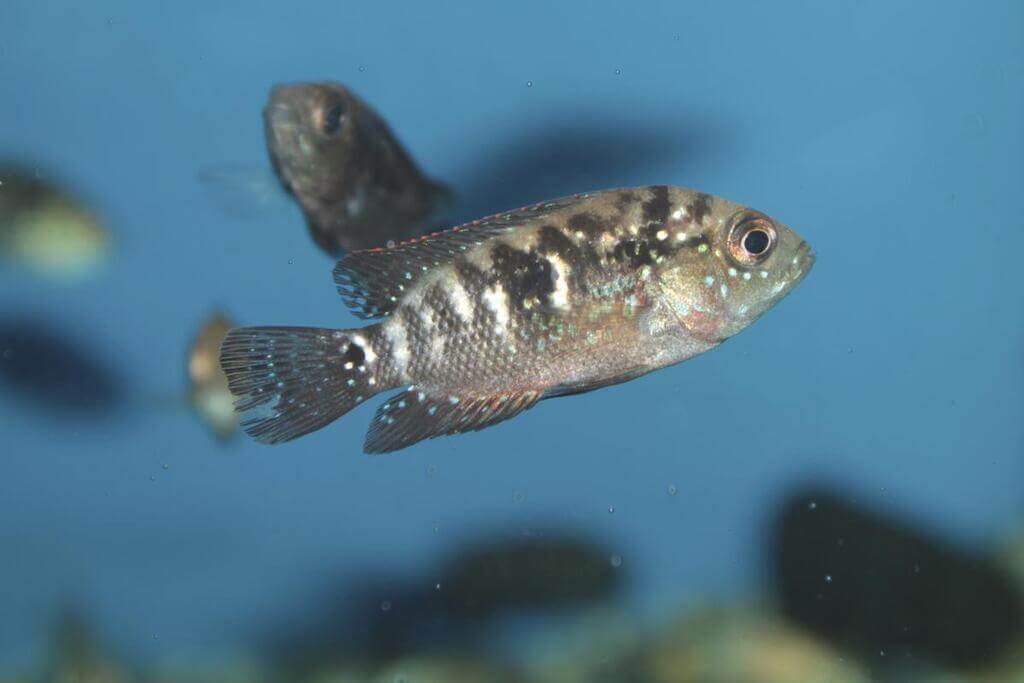
Place origin of Oscar fish in South America. They originate from Orinoco and Amazon river basins. You’ll find them in South American markets as food fish. They are been introducing in other places like Australia, Asia, and North America.
Temperament and Behavior
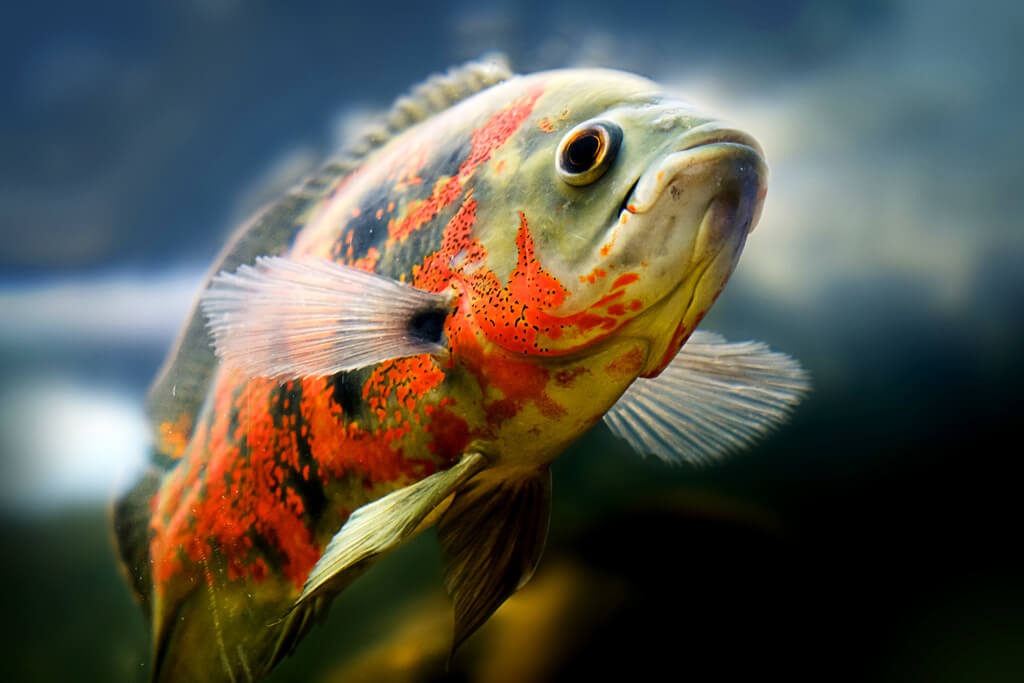
These water dogs are also known as the Oscar fish are territorial. This territorial ness may make them aggressive towards other fishes they are sharing their space with.
So you need to make sure the tank is large enough to accommodate several fishes to reduce territorial aggression towards Oscar tank mates as these brave fishes won’t mind getting into an altercation, even if it won’t end in their favour at times.
Oscars are free-roaming and enjoy moving about in the entire tank, usually at mid to high water level. They not only show aggression towards their tank mates but also take it out on the decorations and plants by uprooting them in search of food.
These notorious fishes will redecorate the tank depending on their mood. The redecoration is often seen in the form of uprooted plants, overturned rocks, toss aside sticks and substrate. So it’s our advice not to get too attach to or too involve in making the tank look a certain way as your beloved fish won’t stick to the plan.
They not only redecorate the tank but also end up breaking things like filters and other life support items in the tank. To prevent these many aquarists keep these items in a sump, separate from the main tank and away from the fish.
The best part about Oscar is that they are much more intelligent and curious than most fishes and interact with their owner, making them fall in love with them.
Oscar Tank Mates
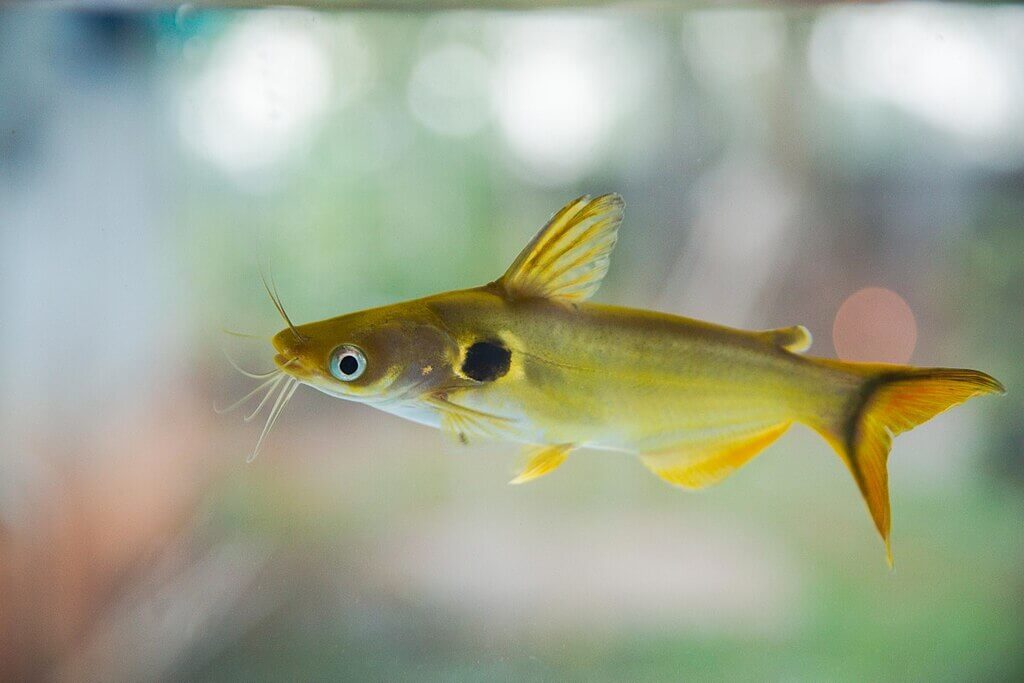
Since Oscars are territorial, you have to be vigilant and careful about who you put as their tank mates. They may not just fight but even end up eating the fish that are smaller than them.
The basic precaution to prevent these fights is having enough space in the tank for all and a good filtration system to handle the waste of all fishes and keep the water clean. Oscar’s fish are very sensitive to water parameters and can get stressed if they aren’t right.
Some suggested fishes as Oscar tank mates are as follows
- Freshwater stingrays
- Common pleco
- Jack Dempsey
- Clown loaches
- Arowana
- Firemouth
- Giant gouramis
- Convict cichlids
- Silver dollars
It’s better to select fishes from a similar region of origin as the Oscars as that will make it easy for you to maintain the water parameters as similar origin fishes thrive in similar waters.
Appearance
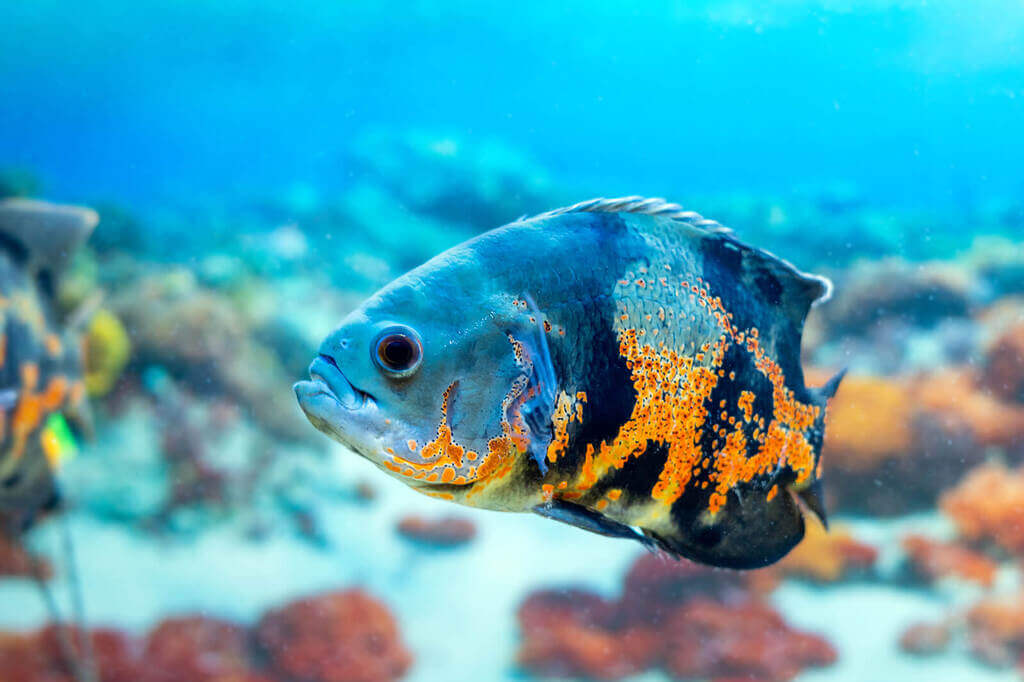
The most common variety of Oscar fish is the Tiger Oscar. They are dark brown to light green in color with red and orange highlights. They show a wide range of colours and patterns with characteristic eyespots or ocelli on the tail fin.
Oscar fishes have oval-shaped bodies, erect fins, fan-shaped caudal fins, and numerous patterns and colors.
Oscar Fish Size
Most Oscars grow quite big with their length ranging from 12 to 14 inches long. Even though these fishes are hardy and easy to care for, Oscar fish size is one of the obstacles when getting them home as they cannot be kept in a small tank.
Their growth rate is nearly about an inch a month and they attain maximum size by 1 year of age.
Oscar Fish Colours and Patterns
- Tiger Oscar: as the name suggests, Tiger Oscar has a black body with orange markings or stripes that run throughout their body and they can reach up to 15 inches in length,
- Blue Oscar Fish: The blue Oscar fish has cool pigments and it shows various shades of blue on its body with some yellow or pink markings.
- Black Oscar: the black Oscar is solid black in colour with different patches and stripes that are in the shades of orange and red.
- Albino Oscar: as the name suggests, they are entirely white in colour. Some have dark orange or red stripes along with the sides of their body.
- Lemon Oscar or green Oscar: this exotic looking fish has a mossy green to lemon shade with subtle black and yellow patterns.
- Red Oscar: red Oscars may come in various intensities of red, mixed with shades of black blending seamlessly into each other.
Diet
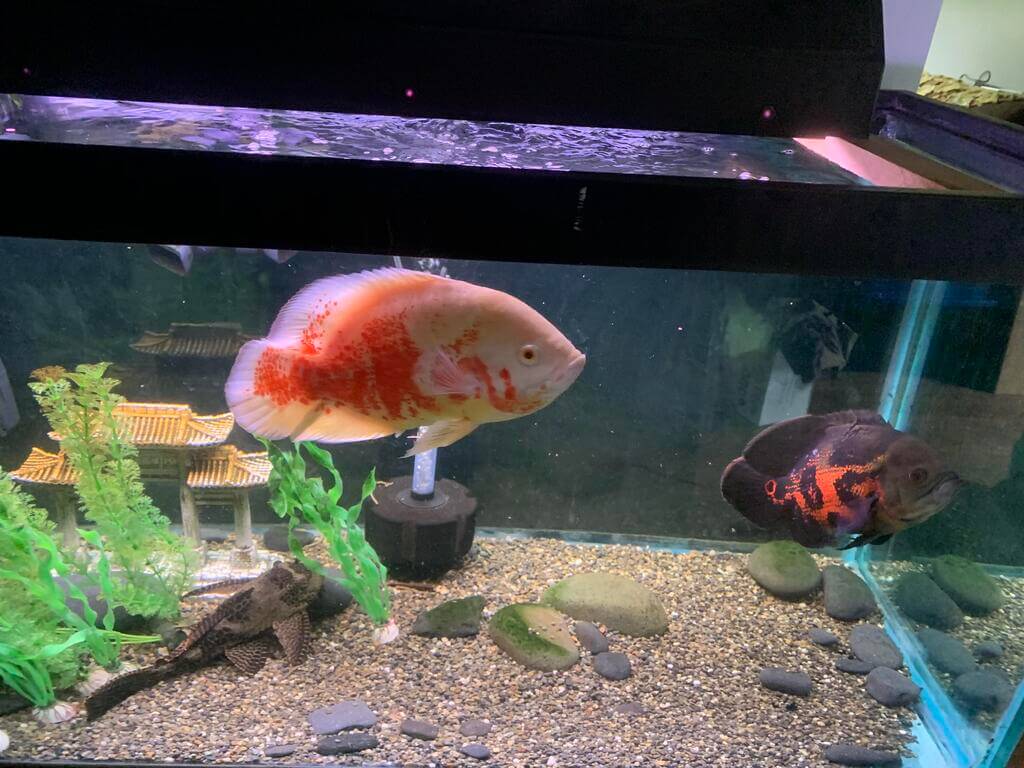
Being omnivores, they require a perfect balance of greens as well as meat. Their diet includes insects, crustaceans, small fishes, larvae and plant debris. Since it’s hard to understand the balanced amount of all these foods, you can also opt for fish pellets or flakes which are engineered to provide them with all-around nutrition.
Blood worms, tubifex worms, frozen krill, brine shrimp, lettuce and spinach make good meals occasionally. Variation in diet keeps them interested in the food and balances the nutritional requirements.
They can feed twice or thrice daily but make sure you only give them the amount that they can consume quickly in a few minutes, leftovers must remove.
Care
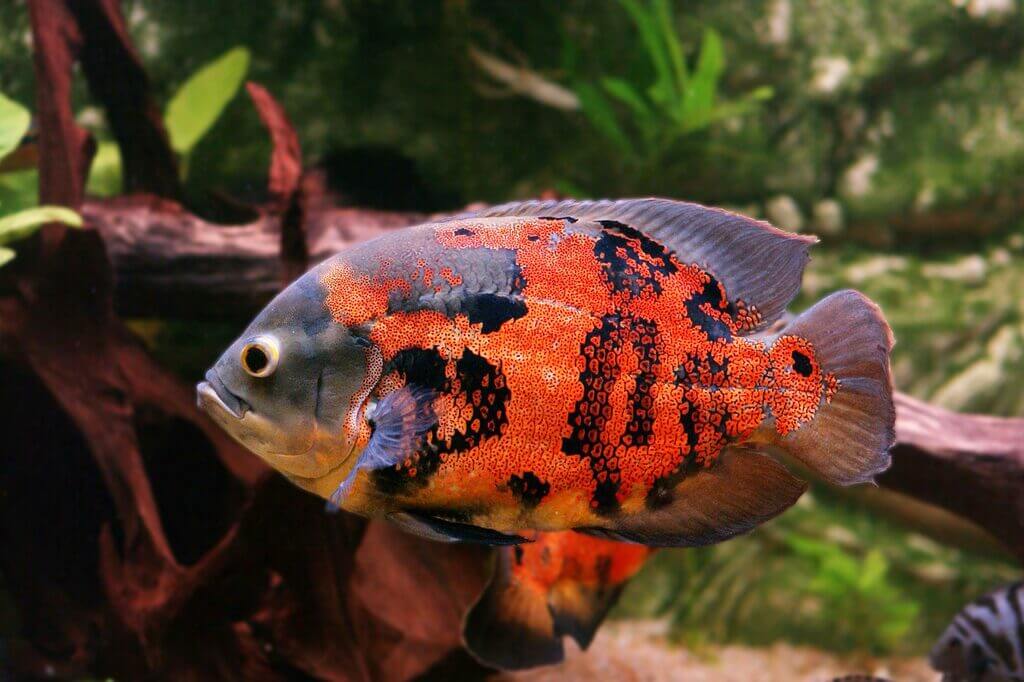
Fish tank size: since Oscars get quite big, a 55-gallon tank is a minimum size required for one Oscar fish. So make sure you double the volume if you decide to get two and increase furthermore depending on the number of fishes.
Tank substrate: Do not use a rough substrate as Oscars love digging and searching for food. Fine-grain sand is a good choice of substrate.
You can fill up the empty spaces and decorate the tank with rocks, pebbles, aquatic plants, and caves. Although, if the plants are firmly secured in place; it’ll take no time for your Oscar fish to uproot it while scavenging.
Temperature and pH
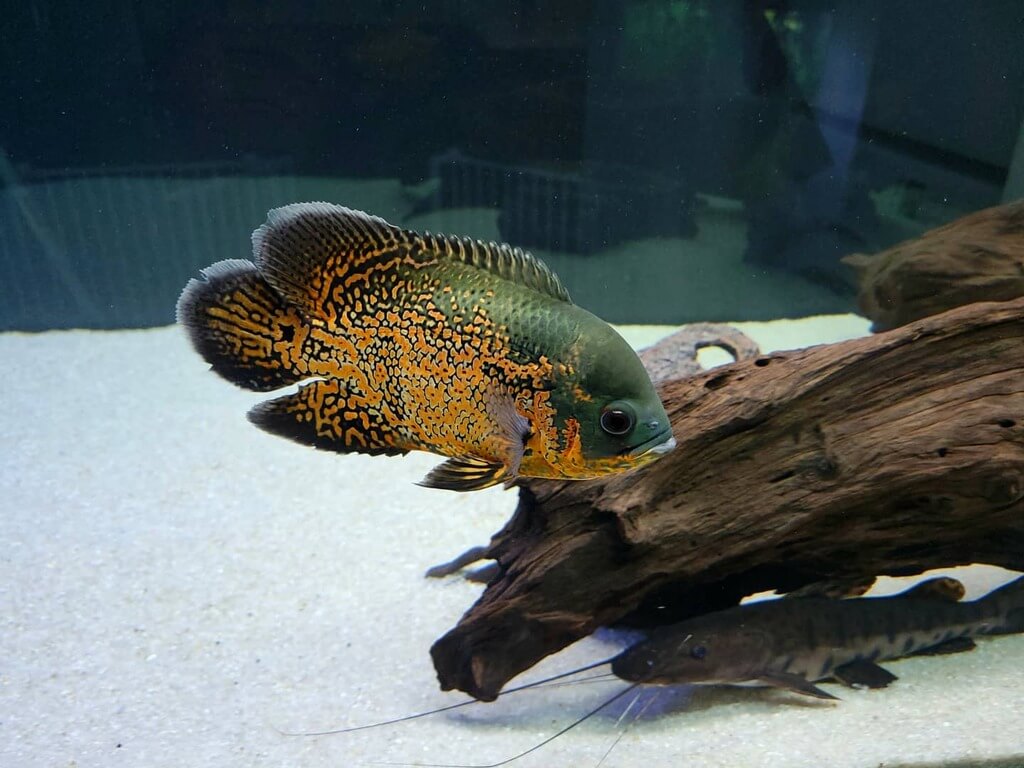
pH must maintain between 6 to 8 which is close to the neutral range. You can use a hydrometer to check the pH and make it convenient to keep an eye on it as Oscar fish is very sensitive to water parameters.
Being from the tropical climate of South America, the temperature requirement of these fishes lies between 75 to 80 degrees Fahrenheit. Make sure you install a water heating system if you live in a cold climatic zone. Thermometers can install for constant and convenient monitoring. An aquarium light can also be useful for this purpose.
Water Conditions

Oscars are used to strong currents in their natural habitat so having a good water flow can keep them enriched and more comfortable.
A good filtration system must be since they are sensitive to fluctuations in ammonia levels. So good biofiltration is necessary to keep them happy and healthy.
How Much Does an Oscar Fish Cost?
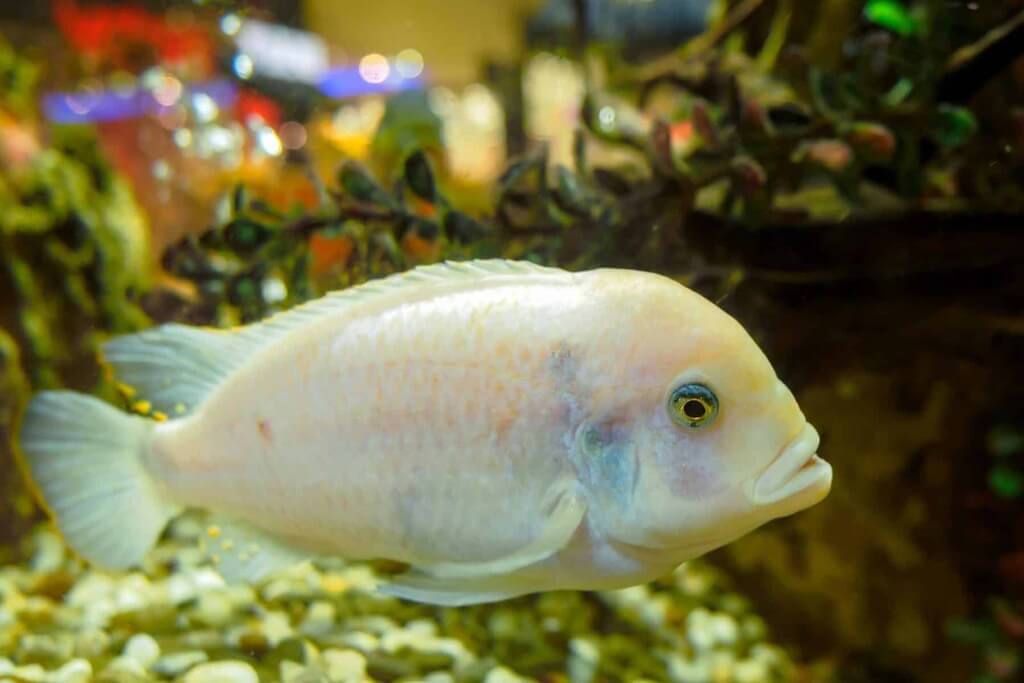
Oscar fish may cost you 10$ on average but their price may differ depending on the variety of fish, quality of breeding, location, etc.
Final Word
Now that you know all about the Oscar fish; you can get a water dog of your own which is much easier to maintain than an actual dog. Just make sure you can commit to it and provide them with all the basic needs.
Find out more :









